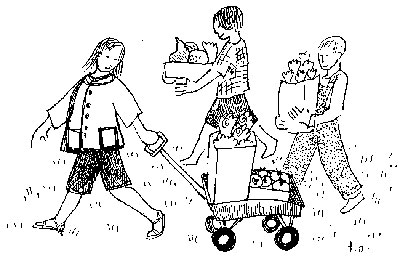 |
| Toki Oshima drawing |
By Jean English
Editor, “The Maine Organic Farmer & Gardener”
As MOFGA develops a long-term, forward-looking strategic plan, I looked backward for inspiration – to our late director Russell Libby’s visionary writing.
“What would Russell plan?” I wondered.
A long list quickly emerged, with four intertwined themes: actions we can take at our own farms, gardens and markets; broader political actions; community-building efforts; and protecting and celebrating the wonder of nature.
Individuals and institutions can cultivate organic farms, gardens and landscapes with diverse plants, including fruit trees, hedgerows and pollinator favorites, said Libby. We can build soil fertility and produce healthy crops by recycling more local resources, as from our seafood and logging operations. We must keep seeds alive and share them; buy organic seeds and challenge seed patents.
Libby repeated the goal, originally voiced by MOFGA-certified organic farmer Karen Volckhausen of Happy Town Farm, that Maine produce 80 percent of the foods we consume. If we buy local, organic foods – including grains for humans and animals – we’ll grow the local, organic market and we’ll create the incentive for more farmers to use organic methods. The more we research and demonstrate that organic methods work, the more organic growers we’ll have. This will help break the cycle of increasing pesticide use, especially with genetically engineered crops, and help ensure “that the water leaving our farms and gardens is as clean as or cleaner than the water landing on our farms and gardens,” said Libby.
We need better processing and distribution infrastructure; and protection for local fisheries.
Our crop producers need to make a decent income. We need to value quality, local, organic products.
Politically we need to articulate our values, support new farmers, challenge seed patents (again!), account for the real economy, “the one where people’s health is more important than paper profits” and “challenge the idea that contamination is just the price of living in the modern world. Contamination is wrong,” said Libby. He suggested the “Rachel Carson Memorial Biological Systems Act,” which would spend a minimum of 10 percent of USDA’s research budget on biological systems so that we can “go beyond the incremental approach that has marked pesticide policy for the last 40 years.”
We must continue to build communities, and we can do that if we “depend on one another in a deep and fundamental way.” Share information. Volunteer. Make quality food accessible for everyone. Donate crops to a food bank. Help someone you know who needs a conversation or a bag of garden vegetables. “That connection builds into something so much greater over time,” said Libby. “Every time we do something for ourselves, or find a way to share or exchange with our friends and neighbors, we take a small step into the real economy – the economy where we depend on one another.”
Libby’s ideas revolved around celebrating the wonder of nature. “Find a place that you love, and protect it,” he said. “Build joy into all that we do.” Sit with friends and family and enjoy what we have. “Together there is a richness that can’t be measured in the stock market.”
Libby was ever hopeful and encouraging. We have a choice between chaos and community, he once wrote. Of course he chose community, with its cooperation, awe and joy; with real home economics shared with friends and neighbors.
Maine is growing richer thanks to the kinds of efforts Libby talked about. Slow Money Maine, for example, is “a real powerhouse in moving ideas forward,” said Libby. The Marsh River Coop in Brooks, featured in this issue of The MOF&G, is another example of the joyful and productive power of community. At MOFGA’s teach-in at the 2015 Common Ground Country Fair, Representative Sara Gideon of Freeport talked about that town’s community solar project, in which a group of home and business owners ordered solar panels together to get a volume price discount – a win for them and for the environment.
And in October John Bunker addressed an audience of 54 – most with an unidentified apple or two in hand – at the Lincolnville Community Library. (Speaking of community, hooray for libraries!) For some 90 minutes he delighted the group while describing the six-plus hours he took to travel some 30 miles from his Palermo home to the library as he meandered Lincolnville, visiting old apple trees and their owners. With no need for a PowerPoint, he traced the pomological history of the town and talked about finding and taking scionwood from a very old ‘Fletcher Sweet’ some years ago with help from then-aged Clarence Thurlow and other community members. The following year both tree and Thurlow died. Thanks to the local community and to the community of apple enthusiasts Bunker has nourished (and he mentioned Libby’s help several times during his talk), our descendants will be able to celebrate and enjoy ‘Fletcher Sweet’ and many other wonderful old varieties.
Find a tree, plant a tree, call a legislator, fill a library, share a freshly baked organic apple pie. Sound like a strategic plan? Thanks, Russell!
